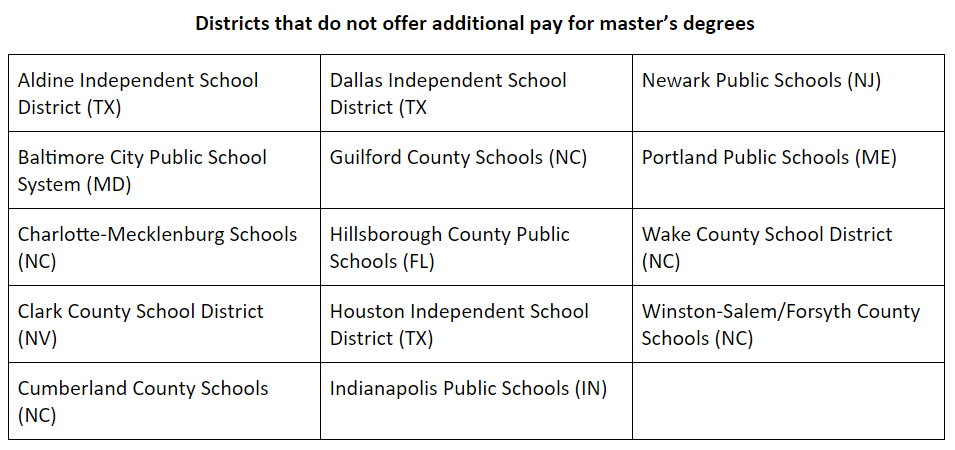Over and over, research suggests that earning a master's degree does not make teachers more effective. Yet, earning an advanced degree continues to be a cornerstone of how school districts increase teachers' pay. Using the NCTQ Teacher Contract Database, you can see that 88 percent of large districts (including the 100 largest districts in the country and the largest in each state284) offer additional pay to teachers who hold master's degrees. This post explores the relationship between how districts compensate and how much teachers earn for holding advanced degrees.
How teachers earn more for advanced degrees
Among the largest districts in the country, 88 percent offer an increase in pay to teachers who earn master's degrees. Districts take two broad approaches to how they factor master's degrees into pay: they can offer a set amount of money (often in the form of an annual stipend), or they can offer additional pay that varies with teachers' years of experience (generally by embedding new "lanes" or columns for advanced degrees into the salary schedule). The majority of these districts take the latter approach.
There are a few districts with unique takes on compensating for a master's degree. In Shelby County Schools (TN), teachers who earn a master's degree receive a stipend of $1,250 for only four years (rather than each year they hold degree) and they must receive high evaluation ratings to be eligible. In Jordan School District (UT), teachers earn the equivalent of additional years of experience for earning a master's degree, which allows teachers with advanced degrees to reach the top of the single lane salary schedule faster.
Eleven districts do not offer any pay differentials for advanced degrees. In addition, three districts—Baltimore City Public School System, the Clark County School District (NV), and Portland Public Schools (ME)—do not offer additional pay for advanced degrees, but do offer some form of compensation for additional higher education credits regardless of whether they lead to a degree.
How much money is a master's degree worth?
On average, a master's degree earns teachers an additional $2,760 in their first year of teaching compared to a bachelor's degree. This salary advantage expands to an average of $7,358 per year by the time a teacher reaches the maximum point of the pay scale.
This salary differential can be substantial. A teacher can earn an additional $10,000 per year or more for holding a master's degree by the time she makes it to the very top of the salary scale in 27 large districts. In Montgomery County Public Schools (MD), for example, teachers at the top of the salary schedule with a master's degree or an equivalent number of credits make $36,716 more than a teacher at the top of the salary schedule with a bachelor's degree.
How you pay matters
On average, across all three points in a career examined above, districts that offer all teachers the same amount for a master's degree pay an additional $1,726 while districts that vary the amount based on experience offer $11,561, over six times as much.
This difference is driven by two factors. First, in all but one of the districts that vary the amount paid for a master's degree based on experience, teachers are paid on a traditional step and lane salary system, with the additional raises for advanced degrees embedded within the salary schedule. Teachers must earn credits and advanced degrees to move to higher salaries. In these instances, when the entire salary schedule increases due to a cost of living adjustment or other factors, so too does the pay for advanced degrees.
Second, about 40 percent of districts that vary the amount based on experience also have more steps on the salary schedule for teachers with master's degrees, thus essentially requiring further education to continue earning increases in salary for experience. For example, in Omaha Public Schools, teachers can advance 13 times if they have a bachelor's degree and 17 times if they have a master's degree.
Districts are spending a lot of money encouraging teachers to earn advanced degrees that research says don't help make teachers more effective. Instead that money could be used to reward the most effective teachers through performance pay, or help attract and retain teachers in high needs schools and subjects, or even boost early career salaries which leads to larger lifetime earnings.
For more on teacher pay, check out these resources:
District Trendline: How are district and states using pay to staff high-need schools and subjects?

